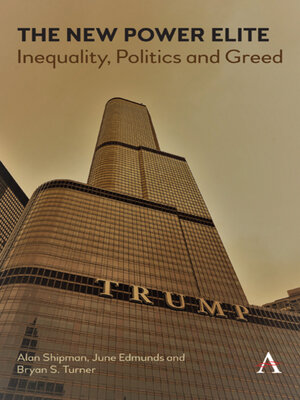The New Power Elite
ebook ∣ Inequality, Politics and Greed · Key Issues In Modern Sociology
By Alan Shipman

Sign up to save your library
With an OverDrive account, you can save your favorite libraries for at-a-glance information about availability. Find out more about OverDrive accounts.
Find this title in Libby, the library reading app by OverDrive.



Search for a digital library with this title
Title found at these libraries:
| Library Name | Distance |
|---|---|
| Loading... |
Elites have always ruled – wielding inordinate power and wealth, taking decisions that shape life for the rest. In good times the '1%' can hide their privilege, or use growing social mobility and economic prosperity as a justification. When times get tougher there's a backlash. So the first years of the twenty-first century – a time of financial crashes, oligarchy and corruption in the West; persistent poverty in the south; and rising inequality everywhere – have brought elites and 'establishments' under unprecedented fire. Yet those swept to power by this discontent are themselves a part of the elite, attacking from within and extending rather than ending its agenda. The New Power Elite shows how major political and social change is typically driven by renegade elite fractions, who co-opt or sideline elites' traditional enemies. It is the first book to combine the politics, economics, sociology and history of elite rule to present a compact, comprehensive account of who's at the top, and why we let them get there.
|The key questions about today's elites are easy to ask. How did a few spectacularly wealthy bankers and fund managers, whose magic money-tree crumbled to sawdust in 2008, get themselves bailed out with public funds that no health service or infrastructure commission could dream of? Why did democratically elected governments allow the '1%', and those at even more exquisite decimal places, to flee further enriched from a market meltdown that would traditionally have culled their 'capital'? Why, when voters in America, Europe and Asia turned against governments that had made them pay twice for corporate excess, did they rally behind dissenting members of the elite, rather than traditional anti-elitist parties? What enables the domination of politics and business by an unchosen few – skewing the distributions of power, wealth and status even further skywards – when such pyramids were meant to be flattened long ago by democratization, meritocratic selection and social mobility?
'Greedy Elites' derives answers from the latest empirical evidence on rising concentrations of economic and political power, allied to new theories of how elites maintain, apply and justify their ascent over the rest of the society. It traces contemporary turbulence to the membership and internal dynamics of elites – economic, political and social – and the way they manage their connections to the rest of society. The composition and conduct of decision-making 'higher circles' remains central to explaining how national and multilateral political arrangements remain stable for long periods, interspersed with phases of abrupt change. 'Greedy Elites' also sheds light on why the patterns of change are often common across countries that differ in strength of democracy and civil society, and why they typically raise fractions of the previous elite to greater prominence, despite mass protest aimed at bringing the whole elite down to earth. Sixty years after C. Wright Mills's pioneering probe of the Power Elite in the US, 'Greedy Elites' offers new and internationally applicable ideas on the importance of frictions within the elite in sparking and steering wider social change; the shifting relationship between power and money within elites; the alternative ways in which elite fractions enrol 'middle' and 'working' class elements in their power struggles, and the typical developmental consequences of elites alternately forming and breaking up distributional class coalitions.







